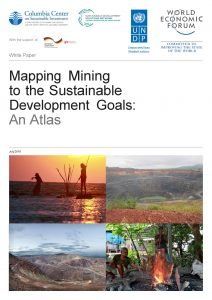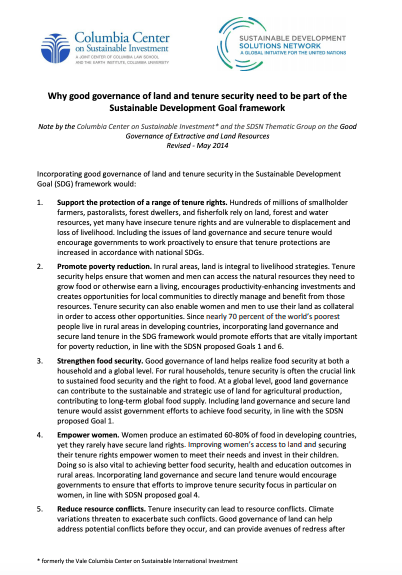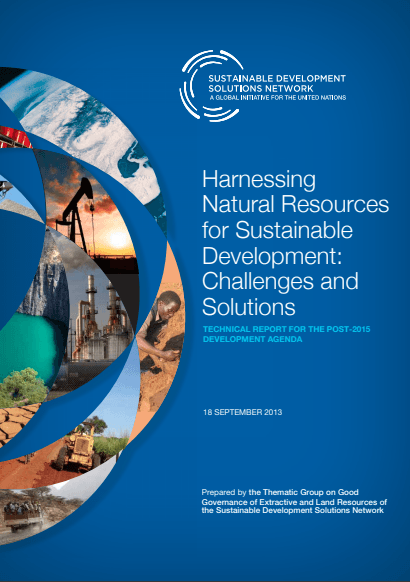Extractive and Land Resources
Filters

By jay
•
05 Jun, 2019
desplácese hacia abajo para español The renewable energy industry is instrumental to the achievement of the UN Sustainable Development Goals (SDGs), which aim to realize a better and more sustainable future for all. In addition to core contributions to the achievement of SDG 7, which focuses on access to affordable, reliable, sustainable and modern energy for all, and SDG 13, on urgent action to combat climate change, the renewable energy sector can also make critical contributions to the other 15 SDGs, including helping to alleviate poverty, fight hunger, increase access to healthcare, education, and clean water, and protect life on land and in water. Given the urgency and scale at which renewables must be deployed to meet the world’s sustainable development and climate goals, it is critical that the industry understand the full range of its potential opportunities and impacts on all of the SDGs. These opportunities and impacts can stem from provision of renewable energy itself, production practices, supply chain sourcing, and corporate governance. While the industry is critical to the transition to a sustainable, low-carbon global economy, some renewable energy projects have also been linked to allegations of human rights abuse, including labor rights concerns, harm to indigenous peoples’ livelihoods, land, and territories, and attacks against human rights defenders. SDSN has partnered with the Columbia Center on Sustainable Investment, the Business and Human Rights Resource Centre, and Equitable Origin to create a shared understanding of how the renewable energy sector can contribute to the SDGs. For each SDG, the Atlas explores potential opportunities and impacts from renewable energy project development, and provides recommendations for companies to better align conduct to the Sustainable Development Agenda. In doing so, the industry stands to bolster the sector’s reputation, attract and retain investors, and minimize risk. Building on the success of our earlier mapping project, Mapping Mining to the Sustainable Development Goals: An Atlas, this Atlas also pays special attention to the interconnections of the human rights framework with the SDGs. ___ La industria de las energías renovables es fundamental para el logro de los Objetivos de Desarrollo Sostenible (ODS) de las Naciones Unidas, cuyo objetivo es lograr un futuro mejor y más sostenible para todos. Además de las contribuciones centrales para el logro del ODS 7, que se centra en el acceso a energía asequible, segura, sostenible y moderna para todos, y el ODS 13, en acciones urgentes para combatir el cambio climático, el sector de las energías renovables también puede hacer contribuciones críticas para los otros 15 ODS, que incluyen ayudar a aliviar la pobreza, combatir el hambre, aumentar el acceso a la atención médica, la educación y el agua limpia, y proteger la vida en la tierra y en el agua. Dada la urgencia y la escala a la que deben desplegarse las energías renovables para cumplir con los objetivos climáticos y de desarrollo sostenible del mundo, es fundamental que la industria comprenda la gama completa de sus posibles oportunidades e impactos en todos los ODS. Estas oportunidades e impactos pueden provenir del suministro de energía renovable en sí, las prácticas de producción, el abastecimiento de la cadena de suministro y el gobierno corporativo. Si bien la industria es crítica para la transición hacia una economía global sostenible y baja en carbono, algunos proyectos de energía renovable también se han relacionado con acusaciones de abuso de los derechos humanos, incluidas las preocupaciones por los derechos laborales, el daño a los medios de vida, la tierra y los territorios de los pueblos indígenas, y ataques contra defensores de los derechos humanos. SDSN ha trabajado con el Columbia Center on Sustainable Investment, el Centro de Información sobre Empresas y Derechos Humanos (CIEDH), y Equitable Origin para crear un entendimiento común de cómo el sector de energía renovable puede contribuir de manera más efectiva a los ODS. Para cada ODS, el Atlas explora las oportunidades potenciales y los impactos del desarrollo de proyectos de energía renovable, y ofrece recomendaciones para que las empresas alineen mejor la conducta con la Agenda de Desarrollo Sostenible. Al hacerlo, la industria puede reforzar la reputación del sector, atraer y retener inversores y minimizar el riesgo. Dándole seguimiento a nuestro proyecto anterior que fue exitoso, Mapeo de la minería en relación con los Objetivos de Desarrollo Sostenible: un atlas, este Atlas también presta especial atención a las interconexiones del marco de derechos humanos con los ODS.

By jay
•
18 Jul, 2016
The Columbia Center on Sustainable Investment (CCSI), UN Sustainable Development Solutions Network (SDSN), United Nations Development Programme (UNDP), and the World Economic Forum have released the report Mapping Mining to the Sustainable Development Goals: An Atlas. The report is available in English, Portuguese, Spanish, and French. The Atlas maps the relationship between mining and the SDGs by using examples of good practice in the industry and existing knowledge and resources in sustainable development that if replicated or scaled up could make useful contributions to the SDGs. Mining companies, their staff, management and boards are the primary audience for the Atlas. The Atlas is also intended to advance the conversation about how mining companies, can work collaboratively with governments, communities, civil society and other partners to contribute to achieve the SDGs. The Atlas contains a chapter for each of the SDGs focusing on the contribution the mining industry can make to that goal through its business operations as well as identifying opportunities for how mining companies can collaborate with other stakeholders. Each chapter also includes case studies on which to draw in building innovative, systematic and sustained collaborative efforts. Some overall conclusions that can stimulate action as well as further debate and research include: The mining industry has the opportunity and potential to positively contribute to all 17 SDGs. While the mining industry is diverse, the scope and nature of typical mining activities highlight some SDGs where mining can have particularly significant impacts. Achieving sustainable development is challenging and the mining industry must ramp up its engagement, partnership, and dialogue with other industry sectors, government, civil society and local communities. This report was initially launched as a draft for public consultation on January 13, 2016. The revised, final version takes into consideration hundreds of comments submitted by dozens of organizations and individuals, as well as several in-person discussions of the document with multi-stakeholder groups.
SIGN UP FOR SDSN UPDATES
Get our latest insights, opportunities to engage with our networks, and more.

SDSN mobilizes global scientific and technological exertise to promote practical solutions for sustainable development, including the implementation of the Sustainable Development Goals (SGDs) and the Paris Climate Agreement.
Paris
19 rue Bergère
75009 Paris
France
+33 (0) 1 84 86 06 60
New York
475 Riverside Drive
Suite 530
New York NY 10115 USA
+1 (212) 870-3920
Kuala Lumpur
Sunway University
Sunway City Kuala Lumpur
5 Jalan Universiti
Selangor 47500
Malaysia
+60 (3) 7491-8622
Designed by
Northeast Kingdom Online. Powered by
NEKO|360.


